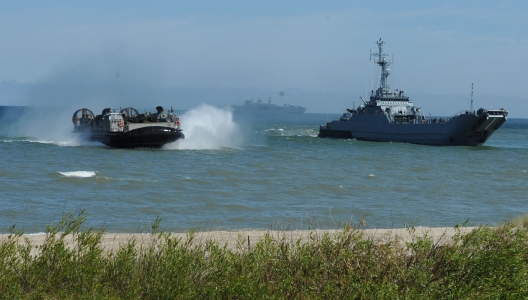 From AFP: NATO should beef up its maritime arm in response to the rising threat from an increasingly “bold” and “aggressive” Russia, commanders said Wednesday.
From AFP: NATO should beef up its maritime arm in response to the rising threat from an increasingly “bold” and “aggressive” Russia, commanders said Wednesday.
The 28-member defense alliance’s naval forces have in recent years focused on issues such as counterterrorism and piracy, but speakers at a London conference said the group needed to prepare more to counter Russian military ambitions.
“Russian international maritime presence has grown significantly in recent years, specifically since the Ukraine crisis erupted in 2014,” senior NATO commander Gen. Adrian Bradshaw told a conference in London on NATO’s naval future.
“The Russian Federation is shadowing and presumably collecting intelligence from NATO nation naval units in the Baltic, the Atlantic, the Mediterranean and the Black Sea, using methods that can be considered bold and sometimes aggressive,” he said….
“We have to reinforce their approach to high-intensity crisis,” Gen. Jean-Paul Palomeros, a senior NATO commander, said, referring to NATO’s maritime arm.
From NATO Maritime Command: [M]ore than 160 NATO and partner nation military and civilian leaders are gathering in London for the two day NATO Maritime Commanders’ Meeting (MARCOMET) to discuss current and future maritime security challenges. The theme for SEA SENSE 2015 is NATO’s Future Maritime Posture – Readiness and Responsiveness for a New Era….
Vice Admiral Peter Hudson, Commander of NATO’s Allied Maritime Command, is hosting the event for the second time, following SEA SENSE 2013 in November 2013.
At our last MARCOMET, I emphasised the need to shift from deployment to contingency,” said Vice Admiral Hudson. “It is now upon us. The Readiness Action Plan mandates a more ready and responsive Alliance, including the maritime domain. This year’s meeting will focus on the challenges we face and on how we can best bring that higher standard of readiness and responsiveness into being.”
[T]he participants will discuss a number of key areas, including the establishment of the maritime element of the planned Very High Readiness Joint Task Force and reformed NATO Response Force, assurance of Baltic and Black Sea Allies in the context of the Ukraine crisis, the multiple challenges of the Mediterranean and the evolving nature of naval warfare in the 21st century.
Image: NATO BALTOPS Exercise, June 17, 2015 (photo: NATO)
